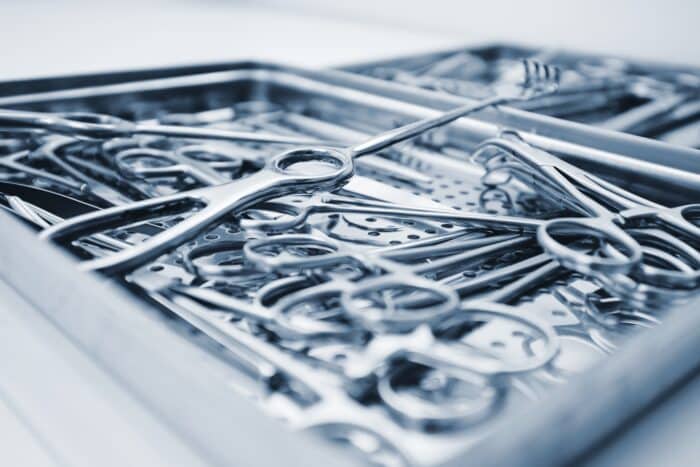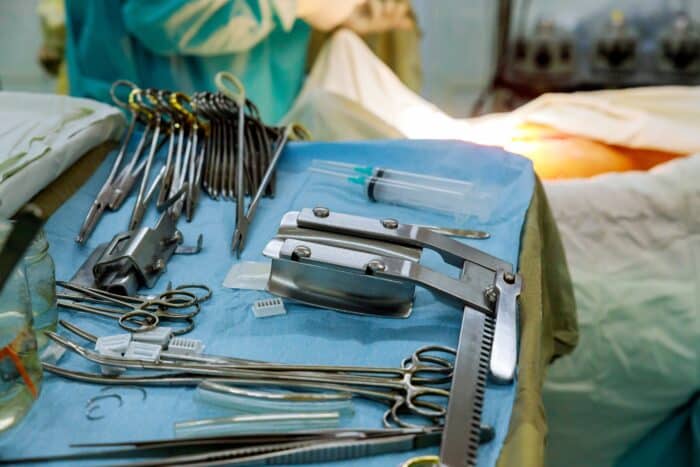Are you an aspiring sterile processing technician considering taking your sterile processing skills on the road?
If yes, you’ve come to the right place. Let us tell you about travel sterile processing technician—a role that brings together your passion for healthcare and a wanderlust spirit.
In this article, we’re diving into the world of these professionals who ensure medical equipment stays squeaky clean while exploring new places and making a difference in healthcare settings across various locations.
So, let’s get started!
What is a Traveling Sterile Processing Technician?
A Traveling Sterile Processing Technician is a healthcare professional who is responsible for ensuring medical equipment and instruments are properly cleaned, sterilized, and prepared for patient use.
They work in healthcare facilities such as hospitals, clinics, or surgical centers, managing the sterilization process to prevent infections and ensure the safety of patients and healthcare workers.
The “traveling” part of their job means these technicians move between different healthcare facilities, either within a region or across the country, to provide their services where they’re needed most. They might work on a contractual or temporary basis, helping facilities that are short-staffed, experiencing a high workload, or undergoing staff training.
Traveling Sterile Processing Technicians’ duties typically include inspecting, cleaning, assembling, and sterilizing surgical instruments, maintaining sterilization equipment, and ensuring compliance with healthcare regulations and industry standards.
Also See: What is a Sterile Processing Technician
How to Become a Traveling Sterile Processing Technician?
To become a Traveling Sterile Processing Technician, you’ll typically need a combination of education, training, and certification. Even though it may sound intimidating, we’re here to tell you that it’s not.
Here are the general steps:
1. Education:
Obtain a high school diploma or GED. While a college degree isn’t always required, some employers may prefer candidates with an associate degree or certification in sterile processing or a related field.
2. Training Program:
Enroll in a sterile processing technician training program. These programs are often offered by community colleges, vocational schools, or hospitals. They cover topics like infection control, sterilization techniques, medical terminology, and equipment handling.
3. Gain Experience:
Acquire practical experience through internships or entry-level positions in healthcare facilities. This hands-on experience is crucial for learning the specifics of sterile processing.
4. Certification:
Pursue certification as a Certified Registered Central Service Technician (CRCST) or through other relevant certification programs like the Certified Sterile Processing and Distribution Technician (CSPDT).
Read: Sterile Processing Technician Certification
6. Consider Travel Opportunities:
Look for job openings or agencies specializing in placing traveling sterile processing technicians. These positions might require travel within a region, across states, or even internationally.
Pros of Pursuing Traveling Sterile Processing Tech Career
This question must have crossed your mind by now: are there any advantages or pros of pursuing a career as a traveling sterile processing tech as opposed to a regular sterile processing tech?
Well, yes there are many!
A career as a traveling sterile processing technician comes with unique advantages compared to a regular sterile processing tech, such as:
- Variety and Adventure: Traveling techs get to work in different healthcare settings, cities, or even states. This brings diversity to their work life, exposure to various practices, and the chance to experience new places and cultures.
- Flexibility: Travel positions often offer more flexible schedules. Techs can choose assignments based on their preferences, allowing for more control over their work-life balance.
- Higher Earning Potential: Travel techs may have higher earning potential due to factors like increased demand in certain locations, special assignments, or receiving compensation for travel and housing expenses.
- Skill Development: Working in different environments can improve skill development. Exposure to various equipment, procedures, and protocols can broaden a sterile processing tech’s expertise.
- Networking Opportunities: Traveling allows techs to build a professional network, connecting with different healthcare professionals and potential employers across various facilities.
- Personal Growth: Traveling can also help you develop personally by encouraging adaptability, independence, and resilience in new environments.
Cons of Pursuing Traveling Sterile Processing Tech Career
As much as there are pros of pursuing a career as a traveling sterile processing tech, like in any profession, there are also a few cons you should consider.
Here are a few challenges you might face:
- Constant Change: Traveling techs move frequently between healthcare facilities, which can lead to a lack of stability and familiarity. Constantly adjusting to new environments, teams, and procedures may be challenging for some individuals.
- Adaptability Stress: Adapting quickly to different workplace cultures, equipment, and protocols at each new location requires high adaptability and flexibility. This constant adjustment can be mentally and emotionally exhausting.
- Limited Social Connections: Traveling techs may find it difficult to build long-term relationships with colleagues or create a strong support network due to the transient nature of their work.
- Uncertain Schedules: Traveling positions may involve irregular work hours or unexpected schedule changes, potentially impacting work-life balance and personal commitments.
See also: How to Become a Sterile Processing Technician
Skills Required to Become a Traveling Sterile Processing Technician
Becoming a Traveling Sterile Processing Technician requires a unique combination of technical skills, soft skills, and adaptability due to the nature of the role.
Here are some key skills you should incorporate if you want to become a successful traveling sterile processing technician:
1. Sterilization Techniques: Proficiency in sterilization methods, including knowledge of different equipment, procedures, and standards for cleaning, disinfecting, and sterilizing medical instruments and equipment.
2. Attention to Detail: Precise attention to detail is crucial to ensure instruments are properly cleaned, assembled, and sterilized according to protocols and standards to prevent infections.
3. Technical Aptitude: Ability to operate and troubleshoot sterilization equipment and machinery commonly used in healthcare settings.
4. Medical Terminology: Understanding medical terminology helps in comprehending the instruments being processed and their specific requirements for sterilization.
5. Adaptability: Being able to adapt quickly to different healthcare environments, equipment, and procedures is essential when moving between facilities.
6. Communication Skills: Clear communication is vital for working with healthcare staff, understanding their needs, and ensuring proper handling of instruments.
7. Teamwork: Collaborating effectively with other healthcare professionals, including surgical teams and central service staff, to ensure efficient and safe instrument processing.
8. Problem-Solving: Having the ability to troubleshoot any arising issues with equipment, understand different sterilization challenges, and find solutions in various settings is invaluable.
9. Compliance and Regulations: Knowledge of industry regulations, standards, and best practices in sterilization procedures to ensure compliance with healthcare guidelines and protocols.
10. Flexibility and Adaptability: Being open to travel, working in diverse settings, and adapting to different work environments, procedures, and team dynamics.
Read more: What Does a Sterile Processing Technician Do?
How Much Does a Traveling Sterile Processing Tech Earn? How is it Different From a Regular Sterile Processing Tech?
Once you’ve dived into the skills and qualifications necessary for a Traveling Sterile Processing Technician, you might want to know how much they earn next.
As per the U.S. Bureau of Labor Statistics (BLS), the average annual salary for a Sterile Processing Technician is approximately $44,940, which means an hourly wage of around $21.61.
On the other hand, Traveling Sterile Processing Techs earn an average annual income of $57,186 per year or $27 per hour, which is significantly more than a regular sterile processing tech.
It is, however, also important to highlight that these figures have been obtained from career sites such as ZipRecruiter since there is no governmental data available for Traveling Sterile Processing Techs.
Another important thing to note is that these salary figures can vary significantly based on factors like geographical location, level of experience, certifications held, and specific employer practices within the field.
Also, the BLS predicts a promising job outlook for Sterile Processing Technicians, projecting a 9% job growth rate over the coming years, indicating more favorable prospects compared to certain other occupations.
Read: Certified Sterile Processing Technician
Conclusion
To sum it up, Traveling Sterile Processing Technicians are super important in keeping medical tools clean and safe in different places like hospitals. They make sure everything is sterile, which helps patients stay healthy and healthcare run smoothly.
Also See: Sterile Processing Technician Certificate Program Online
Related Resources:
- Sterile Processing Technician Salary
- Sterile Processing Technician Requirements
- Sterile Processing Technician Resume
- Sterile Processing Technician vs. Surgical Technologist
- Sterile Processing Technician School
- Sterile Processing Technician Course
- Sterile Processing Technician Training Program Cost
- CRCST Certification
Related Articles
-
How to Be Successful in College in 2022 – 7 Simple Tips to Succeed
-
How Do Scholarships Work? Read This First…Truth is Shocking
-
7 Best College Majors 2024: What Should I Major In?
-
How to Choose a College – 10 Things You Must Consider in 2024
-
Why Go to College? Top 13 Benefits for Adult Students in 2022
-
Top 5 Best Alternatives to Community College for 2024








